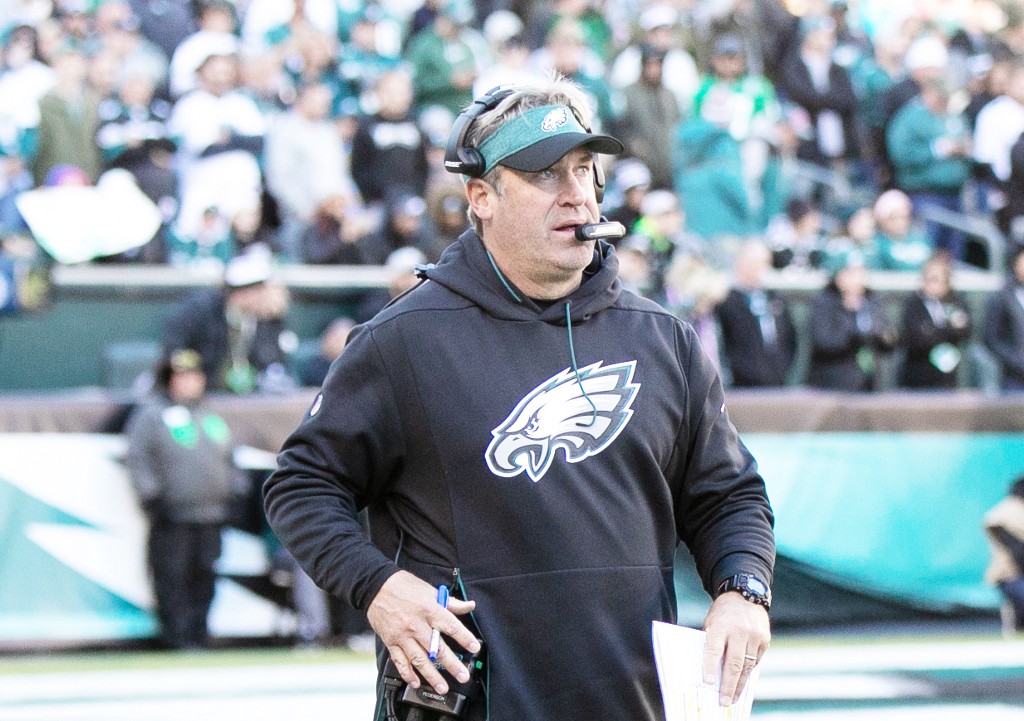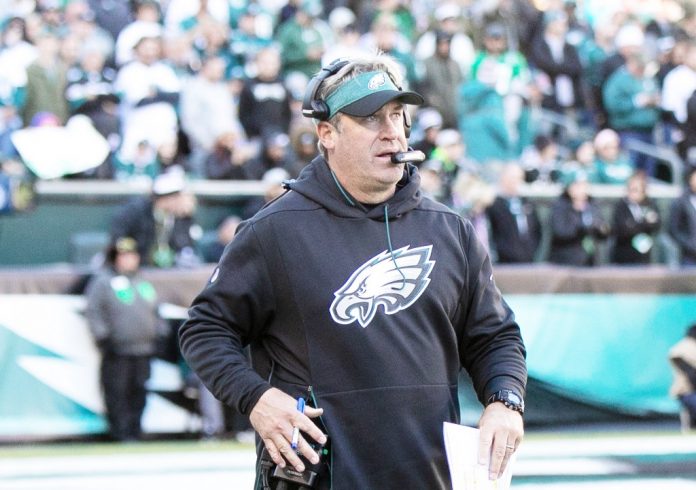The Panthers scored 21 unanswered points in the fourth quarter to defeat the Birds 21–17, leaving them with their fourth loss and looking for answers.

By Al Thompson
During the news conferences following the Eagles’ remarkable run to winning the franchise’s first Super Bowl, Eagles coach Doug Pederson talked about how players and fans should look for the “new normal” of success and “embracing the target” that would be on their backs this season.
After losing three of four games and falling to 3–4 on the season, Pederson is forced to deal with the target that is squarely on his back.
Core stars such as quarterback Carson Wentz, tackle Jason Peters, wide receiver Alshon Jeffery and linebacker Jordan Hicks are all back from injury. So is prized cornerback, Sidney Jones, a high 2017 draft pick who missed virtually all of last season from a ruptured Achilles tendon.
Still, the Eagles are losing, and the questions are piling up. In two of his team’s four losses, Pederson has watched big second-half leads evaporate.
Against the Tennessee Titans on Sept. 30 in Nashville in front of a huge Eagles contingent of fans that made up over half of Nissan Stadium, the Eagles had a 17–3 lead with 7:36 left in the third quarter. The Birds lost in overtime 26–23.
Last week against the Carolina Panthers at home, the Eagles held a commanding 17–0 lead entering the fourth quarter.
For some unknown reason, the Birds, as a team, simply stopped playing.
Led by quarterback Cam Newton, the Panthers roared back to score 21 unanswered points in the fourth quarter to defeat the Birds 21–17, leaving them with their fourth loss and looking for answers.
At Monday’s news conference, it was easy to tell Pederson was feeling the heat.
After Sunday’s loss, Pederson had said the pressure was off now and the team could relax and play well now that the expectations had been lowered.
Monday, he was asked why has the message changed since the offseason.
“I think what you have to understand is, I was asked a question about the locker room, and how I addressed the football team, and part of that was just saying that. Listen, no one gives us a rat’s chance winning or losing. They’ve kind of written us off, so to speak,” Pederson said.
“From that standpoint, yeah, the pressure should be off. We shouldn’t have any pressure going into football games. Even though, listen, don’t misunderstand, there’s pressure with every football game. Pressure to win, there’s all of that. Sometimes, players, coaches and teams put pressure on themselves when they don’t have to, you know what I mean? To make a play.”
Pederson went on to say he reminded the team to play the game as it is in front of them, to not make challenges where there aren’t any.
“I talk to this team a lot about how you don’t have to go looking for plays,” Pederson said. “There’s enough out there. Plays are going to come to you. When they come to you, make the play in the game. I believe Carolina had 58 or 59 plays in the game, right? You don’t have to make them all. So I think sometimes we put that added pressure on top of us, and sometimes that can affect the way guys play.”
At one point, Pederson was asked how he was handling pressure.
“From you guys?” he said. “Great.”
Pederson was cordial until he was asked about play-calling and if the suddenly punchless rushing attack was affecting how he called plays. Last year, the Eagles were among the top three teams in the NFL in rushing every week.
When the Birds let LeGarrette Blount walk and sign with the Detroit Lions, his 766 yards and 4.4 yards per carry went with him. The Eagles brass figured Darren Sproles would be back, and Jay Ajayi was in a contract year and would be productive. Also, Corey Clement would be back for his second year and would be better.
None of that has happened. Sproles was hurt in game one and has not played. Ajayi is out for the year with an ACL, and Clement has missed two games and has been playing hurt.
That leaves Wendell Smallwood to pick up the slack and, unfortunately, to pick up blitzes, or at least try to. Last week, the third-year running back acknowledged that, while at West Virginia, blocking was not his job.
“I think I picked up one blitz in college,” Smallwood said.
Wentz is getting clobbered.
Week four, in the loss at Tennessee, Wentz was sacked four times and hit 11 times. Week five, the Birds lost to the Minnesota Vikings 23–21. Wentz was sacked three times and hit eight times.
He was sacked just once in the win over the Giants in week six, but hit five times.
In the Eagles’ loss to the Panthers, Wentz was sacked four times and hit five times.
With so little to go with in the running game, of course Pederson will pass more. How could he grind out the Panthers game with a 17-point lead if he has so few options? Pederson stuck to his guns.
The coach was asked, in terms of closing out of the games, maybe he’s not fully trusting in his ground game.
“I’m trusting it. I’m trusting it,” said Pederson, who was then asked if he had the horses. “Yes, we do. We do.”
Why wasn’t that the approach against Carolina?
“Let me ask you to block 700-pound men sometimes,” Pederson said, clearly on the defense. “It’s not because of lack of effort. It’s not because of scheme. Listen, they get paid over there, they being the defense, get paid a lot, Carolina, to make plays on us. When it breaks down, it breaks down. You run the ball on a first-and-10, and you lose two, you’re second-and-12. Next thing you know, you go a little RPO pass or a play-action pass, you get sacked, you’re third-and-18. Those are all breakdowns that we need to correct and we need to fix. It’s not that I lose confidence in the run game. It’s not that at all.”
Pederson continued to be peppered with questions that second-guessed his strategy Sunday and if the Eagles have the personnel for a rushing attack that can be productive.
Pederson was asked why he shouldn’t be asked about his decisions about his play calling and the pass/rush ratio. It ended the session.
“Now you’re getting into game plan stuff. You’re getting into scheme,” he said. “You guys aren’t in there watching the tape like we are for 18 hours a day and putting game plans together. It’s easy to sit in a press box and say, ‘They should run the ball.’ Come down and stand on the sideline with me and make decisions. I should run it here, I should pass it here, let’s throw a screen here, let’s get the quarterback out of the pocket right here. No, there’s 15 seconds left on the clock.” ••





